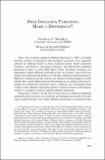Mostrar el registro sencillo del ítem
Does inflation targeting make a difference?
| dc.contributor.author | Mishkin, Frederic S. | |
| dc.contributor.author | Schmidt-Hebbel, Klaus | |
| dc.coverage.spatial | NUEVA ZELANDIA | es_ES |
| dc.date.accessioned | 2019-11-01T00:03:42Z | |
| dc.date.available | 2019-11-01T00:03:42Z | |
| dc.date.issued | 2007 | |
| dc.identifier.isbn | 978-956-7421-28-2 | |
| dc.identifier.uri | https://hdl.handle.net/20.500.12580/3725 | |
| dc.description | Since New Zealand adopted inflation targeting in 1990, a steadily growing number of industrial and emerging economies have explicitly adopted an inflation target as their nominal anchor. Eight industrial countries and thirteen emerging economies had full-fledged inflation targeting in place in early 2005. Many other emerging economies are planning to adopt inflation targeting in the near future. This trend has triggered an intensifying debate over whether inflation targeting makes a difference. Opinions diverge widely over whether central banks are better off after they adopt inflation (forecast) targeting as an explicit and exclusive anchor for conducting monetary policy. Analysts are demanding hard evidence that inflation targeting improves macroeconomic performance relative to countries without explicit inflation targeting. | |
| dc.format | ||
| dc.format.extent | Sección o Parte de un Documento | |
| dc.format.medium | p. 291-372 | |
| dc.language.iso | eng | |
| dc.publisher | Banco Central de Chile | |
| dc.relation.ispartof | Series on Central Banking, Analysis, and Economic Policies, no. 11 | |
| dc.rights | Attribution-NonCommercial-NoDerivs 3.0 Chile | * |
| dc.rights.uri | http://creativecommons.org/licenses/by-nc-nd/3.0/cl/ | * |
| dc.subject | INFLACIÓN | es_ES |
| dc.title | Does inflation targeting make a difference? | |
| dc.type.doc | Artículo | |
| dc.file.name | BCCh-sbc-v11-p291_372 |


